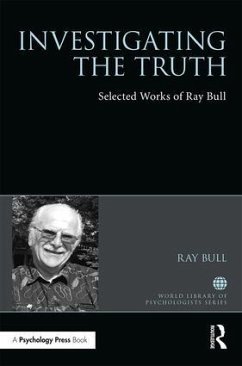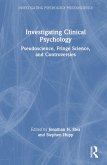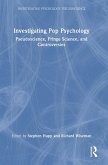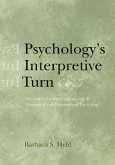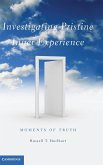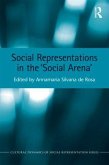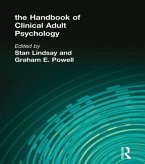- Gebundenes Buch
- Merkliste
- Auf die Merkliste
- Bewerten Bewerten
- Teilen
- Produkt teilen
- Produkterinnerung
- Produkterinnerung
The Selected Works of Professor Ray Bull include some of the most influential insights into the psychology of investigative interviewing. This collection, including an introduction that contextualises how the field has evolved, will be a valuable resource for students and researchers of forensic psychology.
Andere Kunden interessierten sich auch für
![Investigating Clinical Psychology Investigating Clinical Psychology]() Investigating Clinical Psychology204,99 €
Investigating Clinical Psychology204,99 €![Investigating Pop Psychology Investigating Pop Psychology]() Investigating Pop Psychology182,99 €
Investigating Pop Psychology182,99 €![The Truth About Alcohol The Truth About Alcohol]() Richmond Pearson HobsonThe Truth About Alcohol30,99 €
Richmond Pearson HobsonThe Truth About Alcohol30,99 €![Psychology's Interpretive Turn: The Search for Truth and Agency in Theoretical and Philosophical Psychology Psychology's Interpretive Turn: The Search for Truth and Agency in Theoretical and Philosophical Psychology]() Barbara S. HeldPsychology's Interpretive Turn: The Search for Truth and Agency in Theoretical and Philosophical Psychology25,99 €
Barbara S. HeldPsychology's Interpretive Turn: The Search for Truth and Agency in Theoretical and Philosophical Psychology25,99 €![Investigating Pristine Inner Experience Investigating Pristine Inner Experience]() Russell T. HurlburtInvestigating Pristine Inner Experience87,99 €
Russell T. HurlburtInvestigating Pristine Inner Experience87,99 €![Social Representations in the 'Social Arena' Social Representations in the 'Social Arena']() Social Representations in the 'Social Arena'216,99 €
Social Representations in the 'Social Arena'216,99 €![The Handbook of Clinical Adult Psychology The Handbook of Clinical Adult Psychology]() Stan Lindsay / Graham E. Powell (eds.)The Handbook of Clinical Adult Psychology252,99 €
Stan Lindsay / Graham E. Powell (eds.)The Handbook of Clinical Adult Psychology252,99 €-
-
-
The Selected Works of Professor Ray Bull include some of the most influential insights into the psychology of investigative interviewing. This collection, including an introduction that contextualises how the field has evolved, will be a valuable resource for students and researchers of forensic psychology.
Hinweis: Dieser Artikel kann nur an eine deutsche Lieferadresse ausgeliefert werden.
Hinweis: Dieser Artikel kann nur an eine deutsche Lieferadresse ausgeliefert werden.
Produktdetails
- Produktdetails
- Verlag: Routledge
- Seitenzahl: 300
- Erscheinungstermin: 18. Oktober 2018
- Englisch
- Abmessung: 240mm x 161mm x 21mm
- Gewicht: 617g
- ISBN-13: 9781138048867
- ISBN-10: 1138048860
- Artikelnr.: 54649318
- Herstellerkennzeichnung
- Libri GmbH
- Europaallee 1
- 36244 Bad Hersfeld
- gpsr@libri.de
- Verlag: Routledge
- Seitenzahl: 300
- Erscheinungstermin: 18. Oktober 2018
- Englisch
- Abmessung: 240mm x 161mm x 21mm
- Gewicht: 617g
- ISBN-13: 9781138048867
- ISBN-10: 1138048860
- Artikelnr.: 54649318
- Herstellerkennzeichnung
- Libri GmbH
- Europaallee 1
- 36244 Bad Hersfeld
- gpsr@libri.de
Ray Bull is Professor of Criminal Investigation at The University of Derby, UK. He has previously held the position of President of the European Association of Psychology and Law. In 2008 he received from the European Association of Psychology and Law the Award for Life-time Contribution to Psychology and Law. He regularly acts as an expert witness and conducts workshops/training on investigative interviewing.
Introduction Part 2 - Investigative Interviewing of suspects 1. Leahy-Harland
S.
& Bull
R. (In press). Police strategies and suspect responses in real-life serious crime interviews 2. Bull
R. (2013). What is 'believed' or actually 'known' about characteristics that may contribute to being a good/effective interviewer? 3. Walsh
D.
and Bull
R. (2012). Examining rapport in investigative interviews with suspects: Does its building and maintenance work? 4. Soukara
S.
Bull
R.
Vrij
A.
Turner
M.
& Cherryman
C. (2009). A study of what really happens in police interviews with suspects. Part 3 - Investigative Interviewing of children 5. Bull
R. (2010). The investigative interviewing of children and other vulnerable witnesses: Psychological research and working/professional practice 6. Almerigogna
J.
Ost
J.
Bull
R.
& Akehurst
L. (2007). A state of high anxiety: How unsupportive interviewers can increase the suggestibility of child witnesses 7. Flin
R.
Bull
R.
Boon
J.
& Knox
A. (1993). Child witnesses in Scottish criminal trials Part 4 - The 'Cognitive interview 8. Paulo
R.
Albuquerque
P. B.
& Bull
R. (2016). The Enhanced Cognitive Interview: Expressions of uncertainty
motivation and its relation with report accuracy. 9. Milne
R.
& Bull
R. (2003). Does the cognitive interview help children to resist the effects of suggestive questioning? 10. Memon
A.
Wark
L.
Bull
R.
& Köhnken
G. (1997). Isolating the effects of the cognitive interview techniques. Part 5 - Detecting truth/lies 11. Dando
C.
Bull
R.
Ormerod
T.
& Sandham
A. (2015). Helping to sort the liars from the truth-tellers: The gradual revelation of information during investigative interviews. 12. Dando
C.
& Bull
R. (2011). Maximising opportunities to detect verbal deception: Training police officers to interview tactically. 13. Mann
S.
Vrij
A.
& Bull
R. (2004). Detecting true lies: Police officers' ability to detect suspects' lies. Part 6 - Police 14. Bull
R.
& Horncastle
P. (1994). Evaluation of police recruit training involving psychology 15. Bull
R.
& Reid
R. L. (1975). Police officers' recall of information
S.
& Bull
R. (In press). Police strategies and suspect responses in real-life serious crime interviews 2. Bull
R. (2013). What is 'believed' or actually 'known' about characteristics that may contribute to being a good/effective interviewer? 3. Walsh
D.
and Bull
R. (2012). Examining rapport in investigative interviews with suspects: Does its building and maintenance work? 4. Soukara
S.
Bull
R.
Vrij
A.
Turner
M.
& Cherryman
C. (2009). A study of what really happens in police interviews with suspects. Part 3 - Investigative Interviewing of children 5. Bull
R. (2010). The investigative interviewing of children and other vulnerable witnesses: Psychological research and working/professional practice 6. Almerigogna
J.
Ost
J.
Bull
R.
& Akehurst
L. (2007). A state of high anxiety: How unsupportive interviewers can increase the suggestibility of child witnesses 7. Flin
R.
Bull
R.
Boon
J.
& Knox
A. (1993). Child witnesses in Scottish criminal trials Part 4 - The 'Cognitive interview 8. Paulo
R.
Albuquerque
P. B.
& Bull
R. (2016). The Enhanced Cognitive Interview: Expressions of uncertainty
motivation and its relation with report accuracy. 9. Milne
R.
& Bull
R. (2003). Does the cognitive interview help children to resist the effects of suggestive questioning? 10. Memon
A.
Wark
L.
Bull
R.
& Köhnken
G. (1997). Isolating the effects of the cognitive interview techniques. Part 5 - Detecting truth/lies 11. Dando
C.
Bull
R.
Ormerod
T.
& Sandham
A. (2015). Helping to sort the liars from the truth-tellers: The gradual revelation of information during investigative interviews. 12. Dando
C.
& Bull
R. (2011). Maximising opportunities to detect verbal deception: Training police officers to interview tactically. 13. Mann
S.
Vrij
A.
& Bull
R. (2004). Detecting true lies: Police officers' ability to detect suspects' lies. Part 6 - Police 14. Bull
R.
& Horncastle
P. (1994). Evaluation of police recruit training involving psychology 15. Bull
R.
& Reid
R. L. (1975). Police officers' recall of information
Introduction Part 2 - Investigative Interviewing of suspects 1. Leahy-Harland
S.
& Bull
R. (In press). Police strategies and suspect responses in real-life serious crime interviews 2. Bull
R. (2013). What is 'believed' or actually 'known' about characteristics that may contribute to being a good/effective interviewer? 3. Walsh
D.
and Bull
R. (2012). Examining rapport in investigative interviews with suspects: Does its building and maintenance work? 4. Soukara
S.
Bull
R.
Vrij
A.
Turner
M.
& Cherryman
C. (2009). A study of what really happens in police interviews with suspects. Part 3 - Investigative Interviewing of children 5. Bull
R. (2010). The investigative interviewing of children and other vulnerable witnesses: Psychological research and working/professional practice 6. Almerigogna
J.
Ost
J.
Bull
R.
& Akehurst
L. (2007). A state of high anxiety: How unsupportive interviewers can increase the suggestibility of child witnesses 7. Flin
R.
Bull
R.
Boon
J.
& Knox
A. (1993). Child witnesses in Scottish criminal trials Part 4 - The 'Cognitive interview 8. Paulo
R.
Albuquerque
P. B.
& Bull
R. (2016). The Enhanced Cognitive Interview: Expressions of uncertainty
motivation and its relation with report accuracy. 9. Milne
R.
& Bull
R. (2003). Does the cognitive interview help children to resist the effects of suggestive questioning? 10. Memon
A.
Wark
L.
Bull
R.
& Köhnken
G. (1997). Isolating the effects of the cognitive interview techniques. Part 5 - Detecting truth/lies 11. Dando
C.
Bull
R.
Ormerod
T.
& Sandham
A. (2015). Helping to sort the liars from the truth-tellers: The gradual revelation of information during investigative interviews. 12. Dando
C.
& Bull
R. (2011). Maximising opportunities to detect verbal deception: Training police officers to interview tactically. 13. Mann
S.
Vrij
A.
& Bull
R. (2004). Detecting true lies: Police officers' ability to detect suspects' lies. Part 6 - Police 14. Bull
R.
& Horncastle
P. (1994). Evaluation of police recruit training involving psychology 15. Bull
R.
& Reid
R. L. (1975). Police officers' recall of information
S.
& Bull
R. (In press). Police strategies and suspect responses in real-life serious crime interviews 2. Bull
R. (2013). What is 'believed' or actually 'known' about characteristics that may contribute to being a good/effective interviewer? 3. Walsh
D.
and Bull
R. (2012). Examining rapport in investigative interviews with suspects: Does its building and maintenance work? 4. Soukara
S.
Bull
R.
Vrij
A.
Turner
M.
& Cherryman
C. (2009). A study of what really happens in police interviews with suspects. Part 3 - Investigative Interviewing of children 5. Bull
R. (2010). The investigative interviewing of children and other vulnerable witnesses: Psychological research and working/professional practice 6. Almerigogna
J.
Ost
J.
Bull
R.
& Akehurst
L. (2007). A state of high anxiety: How unsupportive interviewers can increase the suggestibility of child witnesses 7. Flin
R.
Bull
R.
Boon
J.
& Knox
A. (1993). Child witnesses in Scottish criminal trials Part 4 - The 'Cognitive interview 8. Paulo
R.
Albuquerque
P. B.
& Bull
R. (2016). The Enhanced Cognitive Interview: Expressions of uncertainty
motivation and its relation with report accuracy. 9. Milne
R.
& Bull
R. (2003). Does the cognitive interview help children to resist the effects of suggestive questioning? 10. Memon
A.
Wark
L.
Bull
R.
& Köhnken
G. (1997). Isolating the effects of the cognitive interview techniques. Part 5 - Detecting truth/lies 11. Dando
C.
Bull
R.
Ormerod
T.
& Sandham
A. (2015). Helping to sort the liars from the truth-tellers: The gradual revelation of information during investigative interviews. 12. Dando
C.
& Bull
R. (2011). Maximising opportunities to detect verbal deception: Training police officers to interview tactically. 13. Mann
S.
Vrij
A.
& Bull
R. (2004). Detecting true lies: Police officers' ability to detect suspects' lies. Part 6 - Police 14. Bull
R.
& Horncastle
P. (1994). Evaluation of police recruit training involving psychology 15. Bull
R.
& Reid
R. L. (1975). Police officers' recall of information

